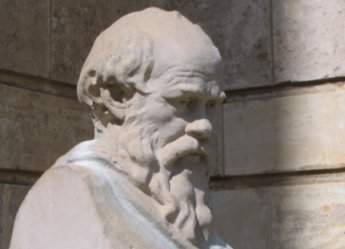|
|
|
Ancient Greece, and especially the city of Athens, produced many people who have become famous throughout the world. In science, in sport, in building, in sculpture, in the writing of books and plays, in mathematics, in thinking about the meaning of life, in war; in almost everything the Greeks seemed to be supreme. Socrates was an Athenian, a stonemason and a common soldier. But Plato, one of the greatest Greek writers said of him, 'Of all the men of his time whom I have known, he was the wisest, most just and the best'. One day Socrates heard a voice inside him, telling him what he should do. He dressed in coarse clothes, ate very plain food and walked about Athens with bare feet, talking to anyone who would listen, and teaching any young man who cared to come to him. He charged no fees and wrote no books. He was interested not in things or in the making of machines, buildings or statues, but in people and what they thought.
He taught people by asking questions, and he asked them so cleverly that the wise men and priests contradicted themselves, and so showed how little they really knew. Socrates did not pretend to be able to answer all the questions himself, but he wanted people to be honest with themselves, and try to reason things out, and not believe things just because they were told. The priests and rulers of Athens hated Socrates, and in 399 BC accused him of causing harm to the young men of the city by his teaching, and condemned him to death by taking poison. Socrates could have escaped, but he refused, saying that the laws of the city must be obeyed. He drank the poison cheerfully, and when a friend asked where they should bury him, answered, 'Wherever you will, if only you can catch me... this body of mine is not the real Socrates. It is better for me that my body should die, and my real self be released to a happier place.' |
(A) Stone masonry and the building of beautiful statues.
(B) Seeing that justice was done and the law obeyed in Athens.
(C) Teaching and instructing the priests and city rulers how to be clever and just.
(D) Talking and listening to fellow citizens of Athens.
(E) Correcting what Athenians thought and said.
(A) For inciting rebellion among young Athenians.
(B) Because he questioned the city rulers' laws.
(C) For trying to poison people.
(D) Alleged his teaching hurt the young Athenian men.
(E) For making the Athenian leaders appear foolish.
c) Socrates taught others by
(A) providing the best example of a scholar in himself.
(B) asking people questions and then giving them the best answers.
(C) pretending he did not know the answers to questions and having people explain things to him.
(D) cleverly telling people what was right and wrong.
(E) asking questions that led people to examine their thinking and feelings about things.
d) Socrates did not try to escape because he
(A) wanted to die with his friends close beside him.
(B) believed the city laws had to be obeyed.
(C) knew the priests and city rulers would only recapture him.
(D) wanted to be an example to his followers.
(E) welcomed death by poisoning.
e) As seen on the streets of Athens in 399BC, Socrates' appearance could best be described as
(A) humble.
(B) absurd.
(C) noble.
(D) ordinary.
f) What is Socrates referring to in his last statement?
(A) His spirit or soul
(B) That his life had not been wasted
(C) His belief that he was right and his accusers wrong
(D) That he did not wish to be buried
(E) His loyalty to his friends, even as he dies of poisoning
h) Socrates was hated by the wise men and the priests for
(A) acting like one of them although he was only a poor man really.
(B) refusing to abide by Athenian laws.
(C) making them look silly with his questioning.
(D) confusing his students and harming them with his teachings.
(E) advising people not to believe what they were told.
i) What does the phrase "of his time" in Paragraph 1 mean?
(B) During that period of history
(C) Of those men known to Plato
(D) In Athens then
(E) Of all the Greeks


